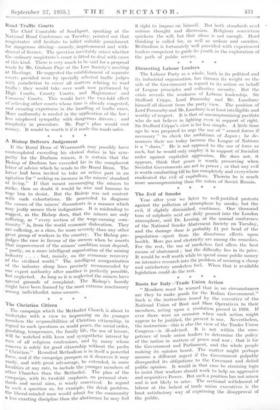A Bishop Delivers ‘ Judgement If the Rural Dean of Wearmouth
may possibly have Contemplated exceeding his clerical duties in his sym- pathy for the Durham miners, it is certain that the Bishop of Durham has exceeded his in the complacent letter of advice which he sends to the Rural Dean. The latter had been invited to take an active part in an agitation for " seeking an increase in the miners' standard of living." If that meant encouraging the miners to strike, then no doubt it would be wise and humane to Urge him to desist. But the Bishop was not content with such- exhortations. He proceeded to diagnose the causes of the miners' discontents in a manner which may justly arouse their indignation. It is misleading to suggest, as .the Bishop does, that the miners are only suffering, as " every section of the wage-earning corn- nanity " is, from the world economic dislocation. They are suffering, as a class, far more severely than any other great group of workers in the country: The Bishop pre- judges the case in favour of the owners when he asserts that improvement of the miners' condition must depend, 4.. partly, on a more intelligent organisation of the mining industry .- . . . but, mainly, on the economic recovery .of the civilised world." The intelligent reorganisation of the industry along lines precisely recommended by enc expert authority after another is perfectly possible, but neglected. As long as it is neglected the miners have special grounds of complaint. The Bishop's homily might have been framed by the most extreme reactionary among individualist mine-owners.
* * * *














































 Previous page
Previous page